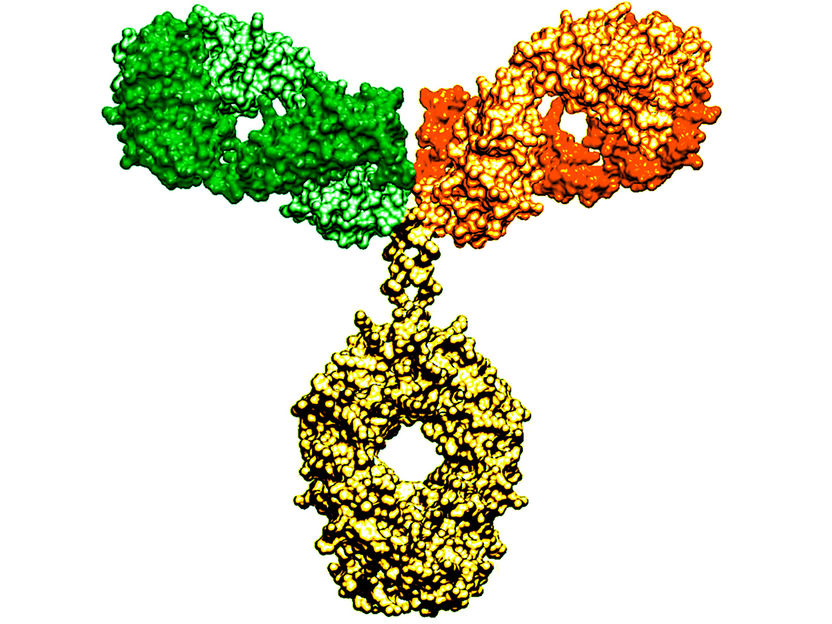New Drug Grips Tumor Cells with Two Arms
Clinical trial in the USA
The first patients with advanced tumors have been treated with a novel antibody-based in a clinical trial in the USA. It uses an invention of the Technische Universität Braunschweig: The team of Professor Stefan Dübel, head of the Department of Biotechnology, discovered a human antibody that targets tumor cells and developed it over many years. This antibody is now part of a complex novel compound against difficult-to-treat cancers that is undergoing clinical testing by the pharmaceutical company Merck.

Model (symbol image) of a bi-specific antibody molecule. The two “gripping arms” (shown in red and green), can couple to two completely different features of the tumor cell simultaneously. This improves the recognition of cancer cells compared to normal body cells around them. The lower part of the antibody (yellow) then generates an immune response against the cancer cell. In addition, the antibody is loaded with an additional anti-tumor drug, which it delivers to just the right place.
Stefan Dübel/TU Braunschweig
M1231 is a biotechnologically engineered molecule, based on a “bi-specific antibody” with two different “gripping arms.” Unlike a normal antibody, which recognizes only one feature of cancer cells, M1231 can use two different features on cancer cells for recognition. Because the two recognized surface structures also occur in small amounts on various other tissues, but not simultaneously, M1231 can identify tumor cells in a highly targeted manner. Furthermore, the antibody is additionally loaded with a pharmaceutical agent that inhibits tumor growth, making M1231 a bi-specific “antibody drug conjugate” (ADC).
After binding to the cancer cells, the bi-specific ADC activates the body’s own immune system against the tumor. In addition, it is also taken up by the tumor cells and then releases the anti-cancer drug directly into the tumor. This new therapeutic approach aims to increase efficacy. At the same time, side effects are expected to be reduced compared to the drugs currently in use.
Clinical trial in the USA
One antibody arm of the ADC molecule was developed at the Technische Universität Braunschweig by the team of Professor Stefan Dübel, while the other is based on the already proven cancer drug Erbitux from Merck in Darmstadt, which is also conducting the clinical development of M1231. The clinical trial (NCT04695847) is now investigating the safety of the compound for patients with metastatic solid tumors, esophageal cancer and non-small cell lung cancer. The study is being conducted in Texas at MD Anderson Cancer Centre in Houston and NEXT Oncology in Austin, and in Canada at Princess Margaret Cancer Centre in Toronto. The study has an expected clinical duration until July 2023.
Improved targeting and fighting capabilities
Professor Michael Hust from the Department of Biotechnology, who has helped to drive the development over the years, said, “Current antibody-based tumor agents help many patients, but unfortunately not all. These aggressive advanced cancers are one of the major unsolved problems in cancer therapy. Improved multiple targeting and fighting functions have been incorporated into M1231, and we are pleased that a biotechnological drug candidate using an antibody developed by us in Braunschweig is now being clinically tested.”
Long and complex development
Professor Dübel: “The example of M1231 shows how long the development of a novel active substance can take. The first precursors of our antibody were already discovered 20 years ago.” The complex development of the antibody into a potential drug based on these initial research results took more than ten years. It was not until 2012 that the patent was granted. In the process, an “evolution in a test tube” was carried out with the help of the antibody phage display co-developed by Dübel, which led to much better properties of the active substance. “But even after that, it took another nine years and countless trials. That’s why it’s a great pleasure to be able to report that, in addition to our COVID-19 drug, another antibody from our lab is now entering clinical trials.”
Dr. Lars Toleikis, whose doctoral thesis started off the development 20 years ago, says: “For me as a biologist and antibody researcher, it is a very special feeling that my work may now contribute significantly to helping life-threatening cancer patients in the future. I am therefore very happy about this news and especially thank the many colleagues and partners who have contributed to this.”
Other news from the department science
Most read news
More news from our other portals
See the theme worlds for related content
Topic world Antibodies
Antibodies are specialized molecules of our immune system that can specifically recognize and neutralize pathogens or foreign substances. Antibody research in biotech and pharma has recognized this natural defense potential and is working intensively to make it therapeutically useful. From monoclonal antibodies used against cancer or autoimmune diseases to antibody-drug conjugates that specifically transport drugs to disease cells - the possibilities are enormous

Topic world Antibodies
Antibodies are specialized molecules of our immune system that can specifically recognize and neutralize pathogens or foreign substances. Antibody research in biotech and pharma has recognized this natural defense potential and is working intensively to make it therapeutically useful. From monoclonal antibodies used against cancer or autoimmune diseases to antibody-drug conjugates that specifically transport drugs to disease cells - the possibilities are enormous






















































